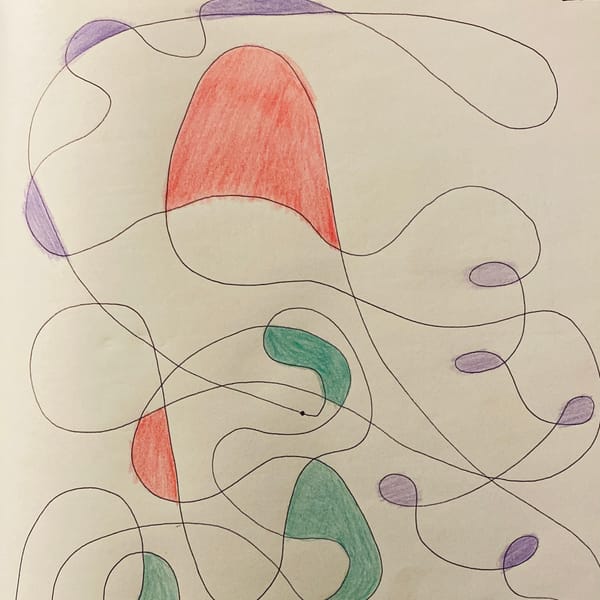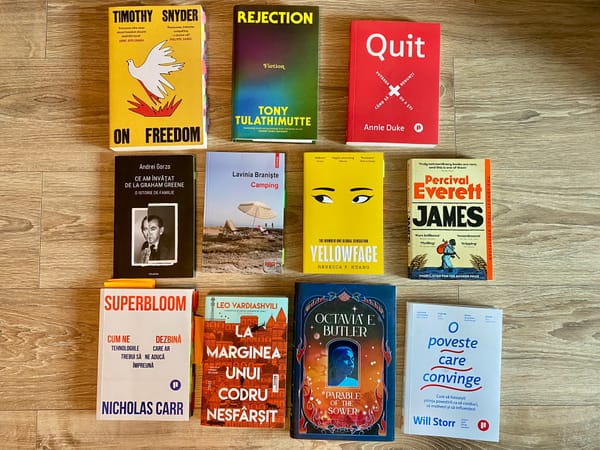Draft Four: Online, angry, and craving virality

Our group chat for the Prea Sărac podcast lit up Friday night. My colleagues were discussing reactions to our first posts – yes, the Instagram is up – and were upset by the tone of some of them. People haven’t heard the show (it’ll launch in October), many might never, so our attempt at complexity could go unnoticed.
The lack of complexity on social media is a platform design choice – infinite scroll depends on minimum effort. Attention is the game, and we decided to play it in the run-up to the launch. Why? Because precarity is not sexy. Not optimistic enough, said a company who told us they couldn’t back it. Cultivating attention as a precursor to product is a deliberate albeit demoralizing strategy. We’re making a pilot season about people in debt, struggling with generational precarity, and it’s complicated.
We believe it’ll sound well enough to hook you. But to get you to even press play, you need to know it exists. Thus the fight for attention, which flattens complexity, and invites responses that sometimes hurt.
For journalists (still) doing complex work, this is tragic – and I don’t use the word lightly. We work hard at the intersection of seeking attention, teasing, and translating complexity into chunky Instagram slideshows hoping a few thousand will also want the whole meal. The tragedy comes because this work exposes the mechanics of the digital technologies we live with. They pretend to connect but, more often than not, they divide.
*
This letter is a recap of things that got me thinking about where the internet is today. I recommend curiosity as a lens to consume them through, at least as antidotes to the utopic idea of open communication as panacea to the world’s problems.
The internet is an anger generating machine. This essay by tech journalist Charlie Warzel looks at the noise around Sydney Sweeney’s American Eagle commercial. Warzel argues that online discourse is broken; the word discourse itself, “a shorthand for the way that a particular topic gets put through the internet’s meat grinder – is a misnomer, because none of the participants is really talking to the others.”
This is an important argument: we don’t converse with others on social media. We shout. What was sold as a relational medium is actually a broadcast medium, and the largest, weirdest, most unhinged megaphone wins.
[Every participant] – be they bloggers, randos on X, or people leaving Instagram comments – are issuing statements, not unlike public figures. Each of these statements becomes fodder for somebody else’s statement. People are not quite talking past one another, but clearly nobody’s listening to anyone else. (...)
This is not a process for sense-making; it is a process for making people feel upset at scale.
This last sentence breaks me. This feeling – that nothing good has come of this – is something I am left with after watching every internet shitstorm. Our words, Warzel writes, are “algorithmic grist for the mills that power the platforms we’ve uploaded our conversations onto. The grist is made of all of our very real political and cultural anxieties, ground down until they start to feel meaningless”.
*
Online community is scarce. Loneliness rules. Tony Tulathimutte wrote a spectacular short-stories-as-novel called Rejection. I read it referred to as “the first incel novel”, because most of the characters are stuck in their own heads, with online discourse as the accelerator leading to violence, depravity and soullessness. While the book itself is not an indictment of technology, the author said in an interview that “it’s ironic that a medium intended to promote transparency, connection, and freedom of information has assplanted on all three.”
One story in the book, Main Character is, in a way, a trolling masterclass. This is what the character – an internet edgelord if there ever was one – concludes about our naivete when we understand the internet as a space to express your true self (Beware: you’ll get bruised badly).
“Understand this is no confession. I never got the point of online apologies, this notion that you’re accountable to strangers who aren’t affected and maybe wouldn’t have even known of your offense, had you not apologized. I guess we feel responsible to the image of ourselves we’ve installed in other people’s heads.
But real accountability requires a community. Online you can meet people, hang out, hook up, meet your soulmate, but it’s not a community. In a real community bonds are hard to dissolve and antagonisms must be sustained, there’s continuity, and unavoidable neighbors. The internet is millions of solitudes blinking in and out of existence, each dreaming the others, where ‘consensus reality’ is less an agreed-upon reality than a reality made of agreement. (…)
It’s a mistake to believe social media is all about hearts and thumbs, flames and eggplants. If everyone were only trying to be liked then it’d be kinder, and way more boring. But discourse is loneliness disguised as war. What people there really want is to be perceived on their own terms, which is so, so funny. Because if the grand promise of the internet was to be whoever you want, in reality it will make of you whatever it wants.”
*
Buy Dubai chocolate. One thing the internet wants to turn you into – aside from a political agitator for mythological right-wing saviors – is a perpetual consumer. On a recent episode of Search Engine, Ryan Broderick (writer of Garbage Day) explained the virality theory of today’s internet using… Dubai chocolate (and Labubus, and matcha, you get the point).
“[Video] on the internet is a form of pornography, because algorithmic platforms have reduced it to [raw stimuli]”, Broderick says. Think of ASMR, people eating on camera, unboxing, whatever genre of stimuli works for you. “It’s sort of like you’re watching someone else do something that you wish you could do and you’re gratifying yourself that way.”
Broderick’s theory is that we used to consume stories (whatever the length and format). Now, especially via TikTok, we’re replacing story grammar with direct stimuli. And that makes much of the content a kind of infinite commercial.
“So YouTube and Instagram – the idea was we could destabilize Hollywood by allowing anyone to make video content, visual content. And that would mean we have an infinite television that can produce things that could have never been produced with the studio system. And then we can get a lot of people hooked on that and watch it all day long. And then we could put ads on it. TikTok is the reverse. So it’s like if we can get everyone to make ads, then those ads can become culture.”
Think of content creators or influencers you’ve seen. A minority are creating stuff, truly taking advantage of the democratization platforms have brought (and the exploitation, but that’s another story). But the majority? They’re making ads: sneakers, festivals, perfume, travel, food, furniture, a lifestyle.
The effect on the culture? Not great. Because it creates discourse (that word again) mostly about things that hogged attention, and most things that have attention are things companies hope you will buy. The quality and worth of the thing itself matters less.
*
Reality Is An Inconvenience. Nicholas Carr ties many of the above together in Superbloom: How Technologies of Connection Tear Us Apart (links to the Romanian translation). I’m partial to Carr because I loved The Shallows, a book from 15 years ago about how the internet rewired our brains. (He was right).
This time, he’s going farther, arguing that modern comms technologies – from the telegraph onwards – promised peace and freedom, but mostly delivered social fragmentation and misunderstanding, overwhelming human psychology with ever-increasing efficiency and stimulation.
He goes through many of the ideas above: social media as empathy-killer, raw stimuli as king of content, the reality that the past few decades have obliterated barriers between the medium and the message. With AI chatbots, they are essentially the same thing.
Carr’s main point is that by removing all friction – infinite scrolls, putting the whole world in our pocket, building machines that can communicate in our stead – we’re leaving ourselves vulnerable to breaking with reality. (Tech-bros actually want this).
“The social and the real have parted ways. No longer tied to particular locations or times of day, social situations and social groups now exist everywhere all at once. We move between them with a tap on a screen, a flick of a finger, a word to a chatbot. And because our phones allow us to socialize all the time, even when alone, interludes of solitude have largely disappeared from everyday life. There’s no offstage anymore, no place insulated from communication and its demands. Everyone is always within earshot and eyeshot. The old social architecture, with its walls and doors, its mornings and afternoons and evenings, has collapsed.”
“When the self collapses into content”, Carr writes, “it shrinks to fit the medium that carries it. Like all the other content it travels with and competes against, it has to be recognizable and decipherable at a glance. It needs to mug and wink and wave, to be memelike.”
Our so-called identity is becoming a collection of bits of information algorithms can decipher. In return, we hope they’ll deliver ease and pleasure with as little effort as possible. Which is why we keep going back, again and again and again. Carr: “People routinely say they worry about how the internet distracts them from their surroundings. But their behavior suggests the reverse is probably closer to the truth. Reality has become a distraction from media.”
*
The above is not destiny, but it doesn’t look good. Even an early technology-booster like Jeff Jarvis sounded cautious in The Gutenberg Parenthesis (which I also recommend). “While the internet has brought challenges such as disinformation, harassment, and exploitation of freedom of speech, it has also catalyzed creativity, connection, and the democratization of communication, amplifying voices previously excluded from mass media and fostering global connections.”
But, he added: “The internet thus far has been built to speak – which I celebrate – but not yet to listen.”
It’s not the internet that needs to listen. It’s us. Will we? Based on our ever-increasing need for pleasure, efficiency and convenience, I doubt it. I wrote about our diminishing focus recently and how attention has become precarious – commodified, harvested, and sold back to us in outrage.
Even when we want to do the hard, meaningful work, our own brains sabotage us, chasing ease.
And when we engage in more complex work, we use some of the attention-seeking mechanisms hoping people will actually consume. Doing such work though is an expensive bet that fewer and fewer are willing to take. (For readers with whom I go back – you know I’m by no means arguing journalism shouldn’t be closer to communities, better at serving and listening etc. I’m saying that even that kind of work – any complex work actually – is becoming a moonshot).
I recently had some great conversations with a brilliant content creator. We were talking about online video, and he more or less asked us journalists: if it doesn’t bring attention, or generate revenue, is it worth doing?
That brutal reality is undeniable: without money and audience, impact is little. But money and audience are a byproduct of attention, so it’s a chicken and egg problem, too.
Some of the most meaningful work I’ve done came from taking bets on stories the market didn’t support. Some became part of the public conversation only after we published them, some moved hearts and minds even as they stayed well under a million views. That kind of civic impact has no accepted ROI. (Unlike Love Island, which is pre-packaged raw stimuli that companies fund because numbers trump social good.)
In the communication ecosystem we’re living in complex stories might not even get a chance to prove themselves, because we are trapped in a loop that validates what scales and hooks, instead of also betting on or rewarding complexity.




